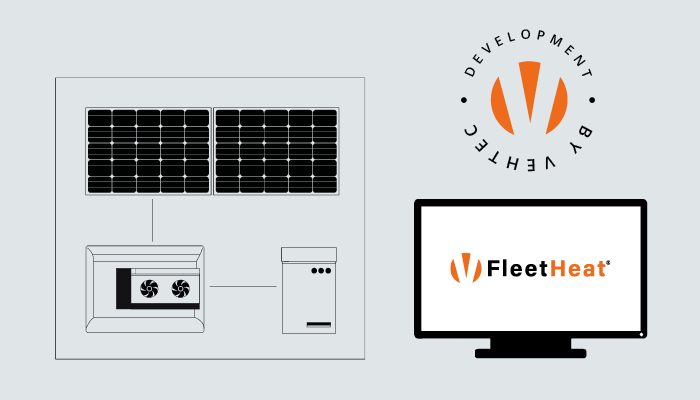We are VEHTEC
VEHTEC develops, produces and delivers products, solutions and concepts for heating and cooling – with minimal environmental impact for optimal energy efficiency for the public transport industry as well as for work machines and trains in an increasingly electrified market.

Our focus is on energy-effective climate control solutions for hybrid and electric buses, as well as on decreasing the dependency on diesel preheating that is still in use on the market.
VEHTEC draws upon extensive knowledge through more than 30 years of experience in developing and producing heating and preheating solutions for the public transport industry.
By careful monitoring, assessment and evaluation of current technology it is possible to develop solutions that tend to current needs and facilitate the transition to newer technology.
We have, through a strategy based on products, patents and trademarks such as 3TEC, VeHeat and FleetHeat, a clear insight into the future requirements of energy-efficient and intelligent heating solutions.
SubZero Solution
A system and a method for control of electric vehicle traction battery preconditioning.
SZS is a Patent pending energy storage system with focus on alternative energy sources, solar panels and hydrogen.
Electric vehicles of today are often – if not always – outfitted with a preconditioning unit configured to regulate the temperature of the traction battery of the vehicle.
A traction battery operating at suboptimal temperature has its capacity, as well as its expected lifetime, greatly reduced. Thus, diesel powered preconditioned units are often provided to regulate the temperature of the traction battery. Using an auxiliary battery and predicting the charge rate of the battery, as well as the power consumption of the preconditioning unit and any other auxiliary systems connected to the auxiliary battery, allows for better control of the preconditioning.
FleetHeat
Heat pumps in combination with solar power is a more complex technical system and thereby require smart control of the bus, both at the depot but also when operating. The FleetHeat with its upgraded software is able to manage and monitor both a solar panel solution and the CO2 heat pump system.
The system could also be combined by a thermal energy storage, PCM-material, that could be managed by the software of FleetHeat at the depot. By charging the thermal energy storage with the CO2 heat pump and applying the smart preheater of electrical buses would bring the driving range up even further. In combination with solar power the electric buses for public city transportation will be the best solution for the future.
VEHTEC Solar Power
Solar panels charge heating batteries to relieve traction batteries in vehicles. By using solar panels, diesel consumption can be reduced or, in the case of an electrical bus, the driving range increased. VSP is based on cooperation with the best verified technology in the world.
Effect: ~200W/m2
Tolerance: -5% – +10%
Supports 12V and 24V batteries
Can be tailor-made to fit on roof
Benefits
- Increasing battery life time
- Reducing grid usage to charge battery in depot
- Embossed structure to improve efficiency
- For Diesel-, Hybrid and Electric vehicles
- Data access and control through FleetHeat
Electric buses in cities for public transportation is becoming popular due to its low climate impact.
However, since there is no heat generated as from a combustion engine it requires other solutions for both heating and cooling. This is a technical challenge as generating heat directly by using the battery would affect the driving range. Previous studies have showed that the driving range can be reduced with 50% by applying this method for direct heating with battery power.
VEHTEC Heat Battery
Proprietary heating batteries (PCM) charged by Eldi or alternative energy sources (Solar, Water).
CO2 Heat Pump
By using a CO2 heat pump for heating and cooling during operation the need for electricity would drop drastically. Heat pumps by CO2 can operate efficiently from -20 °C up to 35 °C and thereby increase the driving range drastically.
In combination with solar panels on bus rooftops, the electrical power need can be reduced even more. In studies with diesel buses, about 20-25% of the electrical energy could be covered by solar power and thereby reduce diesel consumption by 600-750 litres during a one year period.
Data generated from solar panels on vehicles in operation during days in January: current solar radiation (irradiance), amount of energy entering the system and the amount of energy extracted.





